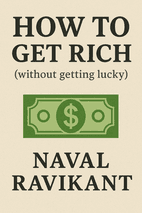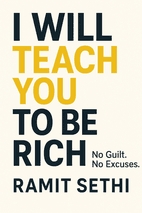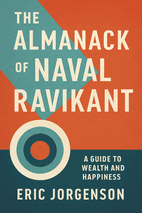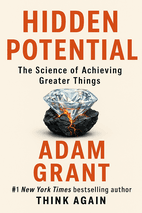
What is the book The Psychology of Money about?
Morgan Housel's The Psychology of Money explores the behavioral and emotional drivers of financial decisions, emphasizing patience and long-term thinking over formulas. It's for anyone seeking to understand the personal side of wealth.
| Feature | Blinkist | Insta.Page |
|---|---|---|
| Summary Depth | 15-min overview | Full Chapter-by-Chapter |
| Audio Narration | ✓ | ✓ (AI narration) |
| Visual Mindmaps | ✕ | ✓ |
| AI Q&A | ✕ | ✓ Voice AI |
| Quizzes | ✕ | ✓ |
| PDF Downloads | ✕ | ✓ |
| Price | $146/yr (PRO) | $33/yr |
1 Page Summary
The Psychology of Money by Morgan Housel explores the often-overlooked emotional and behavioral aspects of personal finance, arguing that financial success is less about hard rules and more about understanding human psychology. Housel emphasizes that money decisions are deeply influenced by individual experiences, biases, and emotions, rather than pure logic or mathematical formulas. Key concepts include the role of luck and risk, the power of compounding, and the importance of flexibility over rigid financial plans.
The book draws on historical examples—from the Great Depression to modern-day market bubbles—to illustrate how financial behaviors repeat across generations. Housel highlights how societal norms, personal upbringing, and unforeseen events shape financial outcomes, often in unpredictable ways. By examining these patterns, he challenges conventional wisdom, such as the belief that wealth is solely the result of intelligence or hard work, and instead underscores the significance of patience, humility, and long-term thinking.
With its accessible storytelling and practical insights, The Psychology of Money has had a lasting impact by reframing financial literacy as a study of human behavior rather than spreadsheets. It resonates with readers by acknowledging the messy, emotional side of money management while offering timeless principles for building wealth, such as living below one’s means and avoiding extreme financial decisions. The book’s enduring appeal lies in its ability to make complex financial concepts relatable and actionable for everyday life.
The Psychology of Money
Introduction: The Greatest Show On Earth
Overview
The chapter opens with a striking contrast between two extremes of financial behavior: a brash tech executive who squanders his wealth on reckless stunts and Ronald Read, a humble janitor who quietly amasses millions through frugality and patient investing. Through these stories, author Morgan Housel introduces the book’s core premise: financial success hinges less on raw intelligence or technical knowledge and more on behavior, self-control, and understanding the psychological forces that drive our decisions.
Housel argues that money is a uniquely human puzzle—one where emotions, ego, and personal history often override logic. He challenges the traditional view of finance as a rigid, math-driven discipline, framing it instead as a “soft skill” shaped by psychology. The chapter sets the stage for exploring how ordinary people can achieve extraordinary financial outcomes by mastering their impulses and embracing patience.
The Tech Executive’s Spectacular Flameout
The tech executive embodies unchecked ego and shortsightedness. Despite his brilliance and entrepreneurial success, his relationship with money is rooted in insecurity and performative extravagance—throwing gold coins into the ocean, overpaying for broken lamps to assert dominance. His downfall underscores a key theme: intelligence alone cannot compensate for poor financial behavior. Housel emphasizes that this pattern—self-destructive habits eclipsing talent—is far more common in finance than in fields like medicine or engineering.
Ronald Read’s Quiet Triumph
In stark contrast, Ronald Read’s story celebrates the power of simplicity and restraint. A gas station attendant and janitor with no formal financial training, Read built an $8 million fortune by consistently saving and investing in blue-chip stocks over decades. His life defies stereotypes of wealth, proving that financial success isn’t about grand gestures or complex strategies. Instead, it’s about discipline, avoiding debt, and letting compounding work silently over time. Read’s legacy—leaving millions to charity—highlights how unremarkable daily habits can yield remarkable outcomes.
Richard Fuscone: When Ambition Outpaces Reality
Richard Fuscone’s tale bridges the gap between the tech executive’s recklessness and Read’s prudence. A Harvard-educated finance star, Fuscone’s career collapse after the 2008 crisis reveals how even the “best and brightest” can succumb to overconfidence. His excessive borrowing to fund a lavish lifestyle—complete with an 18,000-square-foot mansion—left him bankrupt when markets faltered. Housel uses Fuscone’s story to illustrate a critical point: financial fragility often stems from prioritizing appearances and immediate gratification over long-term resilience.
Why Finance Defies Conventional Logic
Housel dissects why finance differs from fields like science or medicine. Unlike physics, where laws are immutable, financial outcomes are shaped by ever-changing human behavior. This explains why a janitor can outperform a Wall Street executive: in investing, patience and emotional stability matter more than credentials. The chapter critiques the finance industry’s obsession with technical models, arguing that real-world results depend on navigating fear, greed, and societal pressures—skills rarely taught in classrooms.
The Author’s Journey and the Book’s Mission
Housel shares his own path to understanding money’s psychological dimensions, beginning with his observations during the 2008 crisis. He realized that traditional financial analysis couldn’t fully explain why people make self-destructive money decisions. This led him to explore history, psychology, and personal narratives—tools he now uses to decode financial behavior. The book aims to distill these insights into 20 concise, actionable chapters, blending storytelling with practical lessons to help readers rethink their relationship with money.
Key Takeaways
- Behavior trumps intelligence: Financial success is less about IQ and more about humility, patience, and emotional control.
- Compounding rewards consistency: Small, disciplined actions (like Read’s steady investing) outperform sporadic brilliance.
- Finance is a soft skill: Understanding your own psychology is more critical than mastering complex formulas.
- Your money story is personal: Individual experiences heavily shape financial decisions—recognize your biases to avoid costly mistakes.
If you like this summary, you probably also like these summaries...
The Psychology of Money
1. No One’s Crazy
Overview
This chapter challenges the notion that people’s financial decisions are inherently irrational or “crazy.” Instead, it argues that our money behaviors are shaped by deeply personal, often invisible, life experiences. From generational economic events to cultural and individual circumstances, everyone develops a unique financial worldview that feels logical to them—even if it baffles others. Through vivid examples—like how the Great Depression scarred some but bypassed JFK, or why lottery tickets offer hope to low-income earners—the chapter underscores that no one’s financial choices exist in a vacuum.
The Weight of Personal History
Our financial instincts are rooted in the economic environments we’ve lived through. For instance:
- Generational imprinting: People who experienced high inflation (like those born in 1960s America) distrust bonds, while those raised in stable economies (born in 1990) barely think about inflation.
- Market timing: A person born in 1970 saw stocks soar 10x during their formative years, while someone born in 1950 saw zero real returns in the same period. These disparities create wildly different attitudes toward investing.
- Trauma and opportunity: Bill Gross’s bond success hinged on falling interest rates—a tailwind his father’s generation, scarred by inflation, couldn’t trust.
Even unemployment isn’t universal: In 2009, Black teen high school dropouts faced 49% unemployment vs. 4% for college-educated white women over 45.
When Worlds Collide: Conflicting Perspectives
Financial debates often ignore how context defines “rationality”:
- Foxconn factories: While Americans criticized working conditions, a Chinese worker’s nephew highlighted how factory jobs were a lifeline compared to alternatives like prostitution.
- Lottery tickets: To critics, spending $412/year on lotteries while struggling to save $400 seems absurd. But for low-income earners, it’s a fleeting shot at a life they’re otherwise locked out of.
These clashes reveal a truth: We judge others through our lens, not theirs. As the author notes, “What you’ve experienced is more compelling than what you learn second-hand.”
The Modern Financial Playbook Is Brand New
Many “common sense” money rules are shockingly recent:
- Retirement: Before WWII, most worked until death. Social Security’s first check in 1940 was $22.54. 401(k)s debuted in 1978; Roth IRAs in 1998.
- College costs: Since 1940, bachelor’s degree holders jumped from 5% to 25% of the population, while tuition quadrupled—leaving families unprepared for student debt.
- Investing tools: Index funds and consumer debt (mortgages, credit cards) only became mainstream post-WWII.
We’re all “newbies” navigating a system with less institutional wisdom than dog domestication (10,000 years vs. 50 years for modern finance).
Key Takeaways
- Your money story isn’t universal: Personal experiences—like recessions, inflation, or cultural norms—shape financial instincts more than logic or education.
- Generational luck matters: When and where you’re born heavily influences your risk tolerance and opportunities.
- Modern finance is a toddler: Retirement planning, college debt, and investing tools are recent experiments, not time-tested norms.
- Empathy over judgment: What seems irrational to you is someone else’s survival strategy. Context is king.
⚡ You're 2 chapters in and clearly committed to learning
Why stop now? Finish this book today and explore our entire library. Try it free for 7 days.
The Psychology of Money
2. Luck & Risk
Overview
The chapter “Luck & Risk” challenges the simplistic narrative that success and failure are solely the result of individual effort. Instead, it argues that luck and risk—two sides of the same coin—play an outsized role in shaping outcomes. Through vivid stories like Bill Gates’ improbable access to cutting-edge computing resources as a teenager and the tragic fate of his friend Kent Evans, the chapter illustrates how forces beyond our control can amplify or derail even the most talented and driven individuals. It urges humility in judging success (both others’ and our own) and emphasizes that nothing is as good or as bad as it seems.
The Paradox of Extremes
Bill Gates’ story exemplifies how rare opportunities—like attending a high school with a computer in 1968—can catalyze extraordinary success. Lakeside School’s forward-thinking investment gave Gates a one-in-a-million head start, paired with his genius and work ethic. Yet the chapter contrasts this with Kent Evans, Gates’ equally brilliant friend, whose life was cut short by a one-in-a-million mountaineering accident. These extremes highlight luck and risk as “siblings”: the same statistical improbability, working in opposite directions.
The takeaway? For every Gates-like triumph, there’s an Evans-like tragedy—both reminders that outcomes hinge on factors no amount of effort can fully control.
The Illusion of Control
Humans crave clean narratives of cause and effect, but luck and risk muddy the waters. Nobel laureate Robert Shiller’s admission—that we can’t quantify luck’s role in success—underscores this tension. Studies, like Bhashkar Mazumder’s on sibling income correlation, reveal how socioeconomic privilege shapes outcomes, yet individuals often dismiss systemic advantages as personal merit.
Similarly, failure is frequently misattributed to poor decisions rather than bad luck. For example, a failed investment might reflect a reasonable risk that simply didn’t pay off. The chapter warns against the hypocrisy of judging others harshly while excusing our own setbacks as “bad luck.”
The Danger of Case Studies
Cornelius Vanderbilt’s law-flouting railroad empire and Benjamin Graham’s GEICO windfall exemplify how success stories often blur the line between boldness and recklessness. Vanderbilt’s defiance of regulations could have just as easily led to ruin, while Graham’s concentrated bet on GEICO contradicted his own investing principles.
The same ambiguity applies to modern icons like Mark Zuckerberg: turning down Yahoo’s $1 billion offer is celebrated as visionary, while Yahoo’s rejection of Microsoft is mocked as shortsighted. The lesson? Outcomes color our interpretation of decisions, making it perilous to extract universal rules from individual cases.
Broad Patterns Over Individuals
Extreme success (or failure) often hinges on outlier luck or risk, making such cases poor models for emulation. Instead, the chapter advocates studying broad patterns—like the link between autonomy and happiness—rather than fixating on billionaires or CEOs. Historian Frederick Lewis Allen’s focus on average lives, rather than outliers, offers more relatable insights.
Gates’ observation that “success is a lousy teacher” reinforces this idea: extreme outcomes can distort our perception of skill and risk. The key is to build resilience (financial and emotional) so failures don’t end the game, and to recognize that even “deserved” success carries hidden debts to luck.
Key Takeaways
- Luck and risk are inseparable: Every outcome is shaped by forces beyond individual control.
- Beware of extremes: Extraordinary success or failure often hinges on rare, unreplicable circumstances.
- Humility in judgment: Avoid attributing others’ failures to incompetence or your own successes to pure skill.
- Focus on systems, not heroes: Seek lessons in broad trends, not outlier stories.
- Prepare for the pendulum: Build margin of safety to withstand life’s inevitable risks, and leave room for grace when outcomes defy expectations.
The chapter closes with a poignant reminder: When things seem exceptionally good or bad, pause. The truth is almost always somewhere in between.
If you like this summary, you probably also like these summaries...
The Psychology of Money
3. Never Enough
Overview
The chapter “Never Enough” explores the perilous psychology of insatiable greed, even among those who’ve achieved extraordinary wealth. Through the stories of disgraced figures like Rajat Gupta and Bernie Madoff, it examines how the relentless pursuit of “more” can destroy reputations, freedom, and happiness. The narrative challenges readers to define their own “enough” before ambition outpaces reason, social comparisons distort reality, and the stakes of risk-taking spiral beyond control.
The Illusion of Infinite Ambition
Rajat Gupta’s journey from Kolkata slums to CEO of McKinsey—and later, to federal prison—illustrates how success can fuel desperation rather than contentment. Despite a $100 million net worth, Gupta’s envy of billionaire peers drove him to insider trading, leaking confidential Goldman Sachs deals to a hedge fund manager. Similarly, Bernie Madoff’s legitimate market-making business earned him millions, yet he risked everything for the fraudulent gains of a Ponzi scheme. Both men had “enough” by any objective standard but sacrificed it all in pursuit of an ever-receding horizon of wealth.
The Goalpost That Never Stops Moving
Warren Buffett’s observation—“To make money they didn’t have and didn’t need, they risked what they did have and did need”—captures the folly of conflating ambition with necessity. The chapter argues that financial satisfaction hinges on freezing the “goalpost” of desires. When expectations outpace achievements, people take irrational risks, mistaking temporary gains for lasting fulfillment. Modern capitalism exacerbates this by equating self-worth with net worth, turning wealth into a game where the rules constantly change.
Social Comparison: A Casino You Can’t Win
The chapter uses a rookie baseball player earning $500,000—rich by most standards but “broke” compared to teammates like Mike Trout—to show how social comparison warps perspective. Even billionaires like Jeff Bezos face upward comparisons, creating a cycle of inadequacy. A Las Vegas casino dealer’s advice—“The only way to win is to exit as soon as you enter”—serves as a metaphor: the race to out-earn others is rigged, and the only escape is to stop playing.
The Irreplaceable Costs of “More”
Gupta’s post-prison reflection—“Don’t get too attached to your reputation”—is framed as a tragic misstep. The chapter counters that reputation, freedom, relationships, and happiness are invaluable and easily shattered by greed. Risking these for marginal financial gains is akin to “eating until you’re sick”—a lesson learned too late. True wealth, it argues, lies in preserving what matters, not accumulating what doesn’t.
Key Takeaways
- Define “enough” early: Letting ambition outpace satisfaction guarantees perpetual dissatisfaction.
- Comparison is a trap: The wealthiest person will always have someone richer to envy.
- Not all risks are equal: Sacrificing reputation, freedom, or relationships for money is a losing trade.
- Wealth ≠ worth: Capitalism’s scorecard is optional; fulfillment comes from valuing what you already have.
The chapter closes with a teaser: The antidote to this cycle isn’t more money, but a mindset shift—one rooted in the “confounding” power of compounding, explored next.
If you like this summary, you probably also like these summaries...
📚 Explore Our Book Summary Library
Discover more insightful book summaries from our collection
FinanceRelated(10 books)

Countdown to Riches
Rhonda Byrne

The Next Perfect Trade
Alex Gurevich

Financial Freedom
Maxx Lionesz

The Automatic Millionaire, 20th Anniversary Edition
David Bach

Smart Women Finish Rich, Expanded and Updated
David Bach

The Psychology of Money
Morgan Housel

Think and Grow Rich
Napoleon Hill

How to Get Rich
Naval Ravikant

I Will Teach You to Be Rich Summary
Ramit Sethi

The Almanack of Naval Ravikant
Eric Jorgenson

